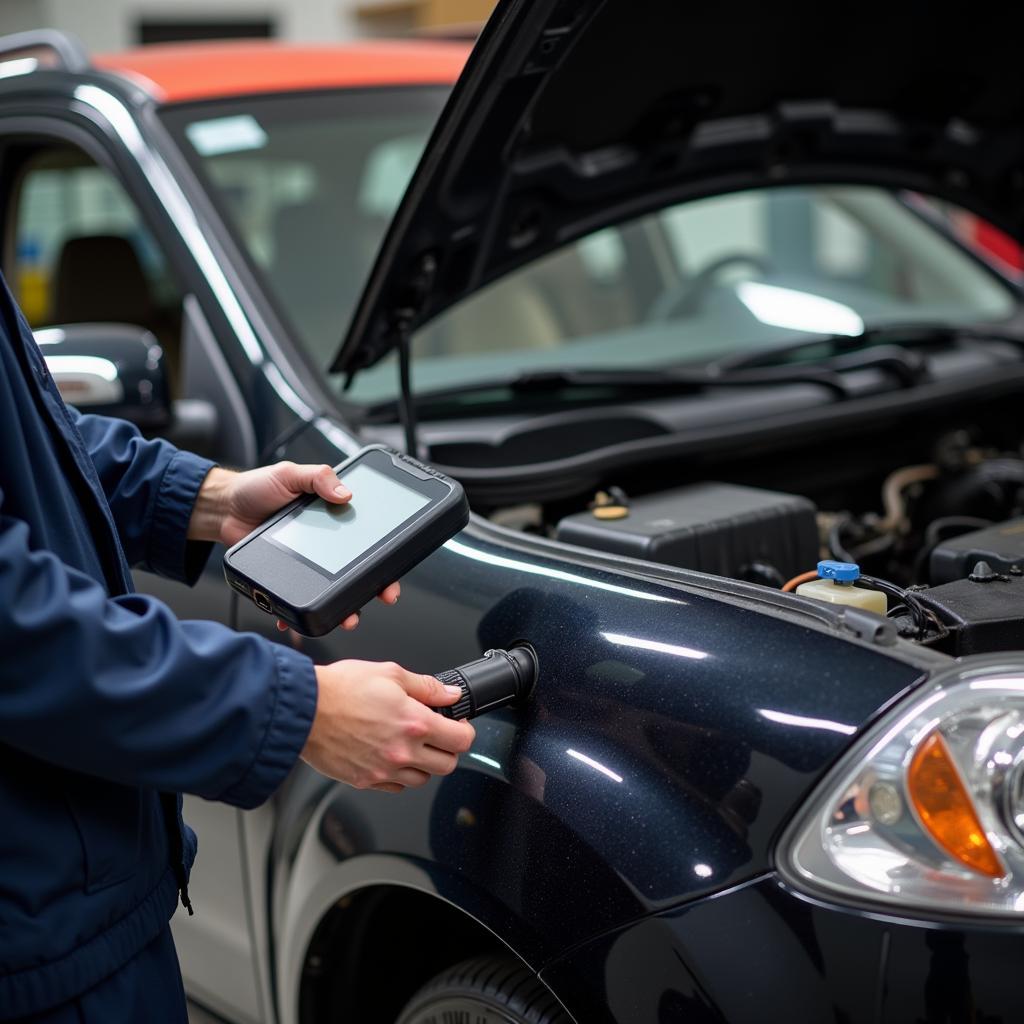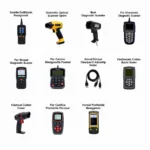When that check engine light flashes ominously on your dashboard, it’s a stark reminder that even the most reliable cars need a little TLC from time to time. Enter diagnostics tests for car – your key to understanding what’s going on under the hood and getting back on the road with confidence. This comprehensive guide will delve into the world of car diagnostics, from understanding their importance to choosing the right tests and even interpreting the results.
Why are Diagnostics Tests for Car so Important?
Gone are the days when mechanics relied solely on their intuition and a trusty wrench to diagnose car problems. Modern vehicles are complex machines, with intricate electronic systems controlling everything from engine performance to safety features. Diagnostics tests for car act as a direct line of communication with these systems, providing valuable insights into the health and performance of your vehicle.
Here are just a few reasons why diagnostics tests are crucial:
- Early Detection of Issues: Diagnostics tests can identify potential problems before they escalate into major (and costly) repairs.
- Accurate Diagnosis: They eliminate guesswork and help pinpoint the root cause of a problem, saving you time and money on unnecessary repairs.
- Improved Performance: By analyzing data from various sensors, diagnostics tests can identify areas for improvement in your car’s performance, fuel efficiency, and emissions.
- Enhanced Safety: Regular diagnostics tests can help ensure that your car’s safety systems, such as airbags and ABS, are functioning correctly.
Types of Diagnostics Tests for Car
There’s a wide range of diagnostics tests available, each designed to provide specific insights into your car’s systems. Some of the most common tests include:
1. OBD-II (On-Board Diagnostics) Scan: This is the most basic and widely accessible type of diagnostics test. It reads data from your car’s On-Board Diagnostics system through the OBD-II port, a standardized connector found in most cars manufactured after 1996. An OBD-II scan can retrieve diagnostic trouble codes (DTCs), which indicate specific areas of concern.
Want to learn more about OBD-II scanners? Check out our guide on buy car diagnostic scanner.
2. Engine Analysis: This in-depth test examines the performance of your car’s engine, analyzing parameters such as fuel pressure, ignition timing, and air-fuel ratio. It can help diagnose problems like misfires, loss of power, and poor fuel economy.
3. Transmission Diagnostics: As the name suggests, this test focuses on your car’s transmission system, checking for issues with gear shifting, clutch performance, and fluid levels.
4. ABS (Anti-lock Braking System) Diagnostics: This test evaluates the health of your car’s anti-lock braking system, ensuring that it’s functioning correctly to prevent wheel lockup during hard braking.
5. Airbag System Diagnostics: This crucial safety test checks the integrity of your car’s airbag system, including sensors, modules, and the airbags themselves.
Understanding Diagnostic Trouble Codes (DTCs)
When you get a diagnostics test, one of the key outputs you’ll receive is a set of Diagnostic Trouble Codes (DTCs). These codes are standardized alphanumeric identifiers that correspond to specific areas of concern within your car’s systems.
Each DTC consists of five characters:
- First Character: Indicates the system related to the code (e.g., “P” for Powertrain, “B” for Body, “C” for Chassis, “U” for Network & Vehicle Integration Control Modules)
- Second Character: Indicates whether the code is generic (“0”) or manufacturer-specific (“1”)
- Third Character: Identifies the specific subsystem within the broader system (e.g., “1” for Fuel and Air Metering, “2” for Fuel and Air Metering (Injector Circuit), “3” for Ignition System or Misfire)
- Fourth and Fifth Characters: These are two digits that specify the particular fault or problem within the subsystem
For example, a DTC of P0301 indicates a problem with the powertrain system (P), specifically a misfire detected in cylinder number 1.
It’s important to remember that DTCs are not a diagnosis in themselves. They are indicators that point to potential areas of concern. Further investigation by a qualified mechanic is often necessary to determine the exact cause of the problem and the appropriate course of action.
How Often Should You Get Diagnostics Tests for Car?
The frequency of diagnostics tests depends on several factors, including:
- Age of Your Car: Older cars tend to require more frequent diagnostics tests as their components are more likely to wear out.
- Mileage: High mileage can also be an indicator of potential problems, warranting more frequent diagnostics.
- Driving Conditions: If you frequently drive in harsh conditions (e.g., extreme temperatures, dusty environments), it’s advisable to get your car diagnosed more often.
- Manufacturer Recommendations: Always refer to your car’s owner’s manual for specific recommendations on diagnostics test intervals.
As a general guideline, it’s a good idea to get your car’s diagnostics checked:
- Annually: As part of a routine maintenance check-up
- Before a Long Road Trip: To ensure your car is in top condition for extended driving
- When You Experience Any Warning Lights or Unusual Performance Issues: This helps identify and address problems early
Choosing the Right Diagnostics Test and Provider
When it comes to diagnostics tests, you have several options:
- DIY OBD-II Scanners: These affordable devices allow you to perform basic diagnostics yourself. However, keep in mind that they may not be able to access all systems or provide in-depth analysis.
- Mechanics and Auto Repair Shops: Most mechanics and auto repair shops offer diagnostics tests as part of their services.
- Dealerships: While typically more expensive, dealerships have specialized equipment and technicians trained specifically for your car’s make and model.
Here are some factors to consider when choosing a diagnostics test provider:
- Reputation and Experience: Look for providers with a solid reputation and experience in diagnosing and repairing vehicles like yours.
- Equipment and Technology: Ensure they use up-to-date diagnostics equipment and software.
- Transparency and Communication: Choose a provider who clearly explains the test results and recommended repairs.
- Cost: Get quotes from multiple providers to compare prices.
DIY vs. Professional Diagnostics Tests: Which is Right for You?
Deciding between DIY and professional diagnostics tests depends on your comfort level with car maintenance and the complexity of the potential issue.
DIY Diagnostics:
Pros:
- Cost-effective: DIY scanners are relatively inexpensive.
- Convenient: You can perform scans at your convenience.
Cons:
- Limited Functionality: DIY scanners may not access all systems or provide comprehensive analysis.
- Requires Some Technical Knowledge: You need to know how to use the scanner and interpret the results.
Professional Diagnostics:
Pros:
- Comprehensive Analysis: Mechanics use advanced equipment and software for in-depth diagnostics.
- Expert Interpretation: Qualified mechanics can accurately interpret results and recommend repairs.
Cons:
- Cost: Professional diagnostics can be more expensive.
- Time: You need to schedule an appointment and wait for the results.
If you’re experiencing a simple issue like a check engine light related to a loose gas cap, a DIY OBD-II scan might be sufficient. However, for more complex problems or if you’re uncomfortable with car maintenance, it’s best to seek professional help.
Need to find a reliable car diagnostics test center near you? Visit our diagnostics test car near me page for a list of trusted providers.
Tips for Getting the Most Out of Your Diagnostics Test
Here are some tips to ensure you get accurate and valuable information from your diagnostics test:
- Provide a Complete History: Be sure to inform the technician about any recent repairs, modifications, or unusual symptoms you’ve noticed.
- Ask Questions: Don’t hesitate to ask the technician to explain any codes or terminology you don’t understand.
- Get a Written Report: Request a written report that includes the DTCs, their descriptions, and any recommended repairs.
- Don’t Rush into Repairs: Take time to research the recommended repairs and get multiple quotes before authorizing any work.
“Regular diagnostics tests are like giving your car a health check-up,” says John Smith, a certified automotive technician with over 20 years of experience. “They can help you catch problems early, saving you from costly repairs and headaches down the road.”
Conclusion: Diagnostics Tests – Your Car’s Best Friend
Diagnostics tests for car are no longer a luxury but an essential part of car ownership. They provide invaluable insights into your vehicle’s health, performance, and safety, helping you make informed decisions about maintenance and repairs. Whether you choose to go the DIY route or seek professional assistance, regular diagnostics tests are a wise investment in the longevity and reliability of your car.
Remember, when it comes to your car’s well-being, knowledge is power. By understanding diagnostics tests, you can take control of your car’s maintenance and enjoy a smoother, safer, and more cost-effective driving experience.
FAQs about Diagnostics Tests for Car
1. Can I drive my car with the check engine light on?
It depends on the severity of the problem. If the light is flashing, it indicates a serious issue, and you should stop driving immediately. If the light is solid, you may be able to drive for a short distance, but it’s crucial to get your car diagnosed as soon as possible.
2. Will a diagnostics test drain my car battery?
No, a diagnostics test uses very little power and will not drain your car battery.
3. Can a diagnostics test tell me if my car needs an oil change?
No, a diagnostics test cannot determine if your car needs an oil change. Oil changes are based on mileage or time intervals, not electronic diagnostics.
4. How much does a diagnostics test cost?
The cost of a diagnostics test varies depending on the provider, location, and complexity of the test. On average, you can expect to pay between $50 and $150 for a professional diagnostics test.
5. Are there any free diagnostics test options available?
Some auto parts stores offer free OBD-II scans, but these may not be as comprehensive as professional diagnostics.
6. What is MCAT car diagnostics?
You might be interested in learning more about MCAT cars diagnostic, a specialized system for certain vehicle brands.
7. Are there courses available for car diagnostics?
Yes, there are various car diagnostic courses manchester and in other locations if you’re interested in learning more about car diagnostics.
8. What is the T300+ car diagnostic tool?
The T300+ car diagnostic china is a popular diagnostic tool used by many mechanics. You can learn more about it on our website.
Need further assistance with car diagnostics?
Contact us via WhatsApp: +1(641)206-8880, Email: [email protected].
Our dedicated customer support team is available 24/7 to answer your questions.


